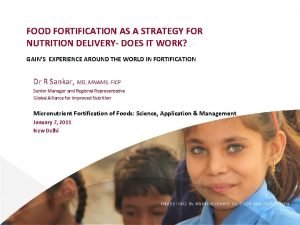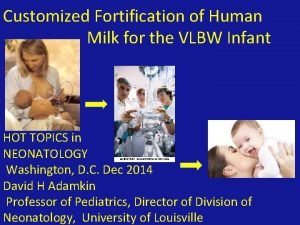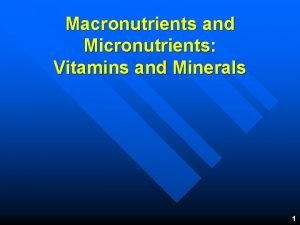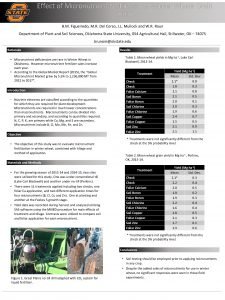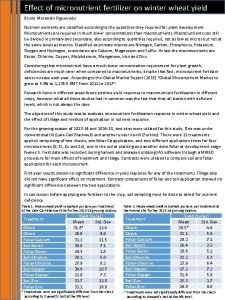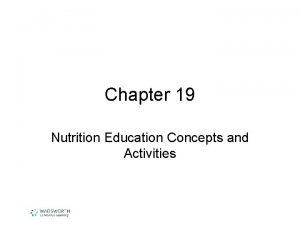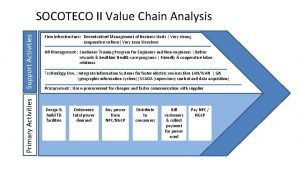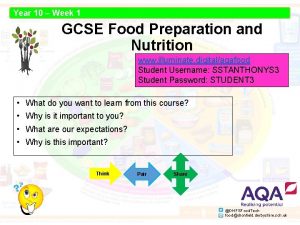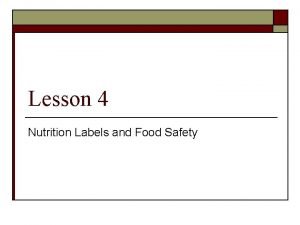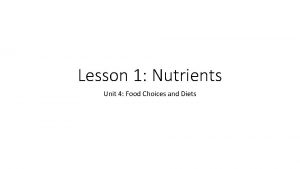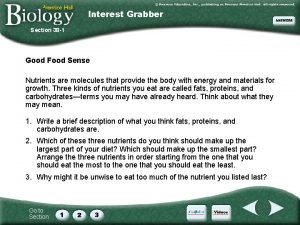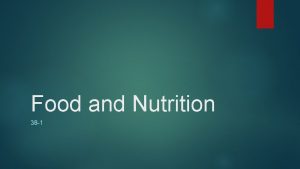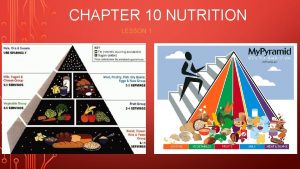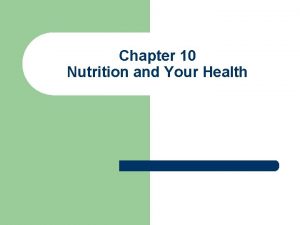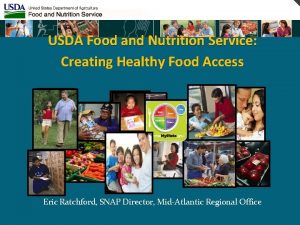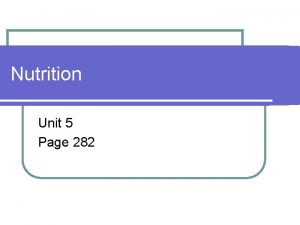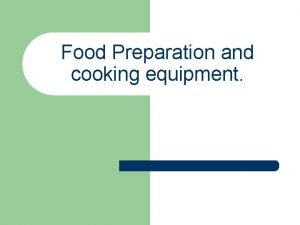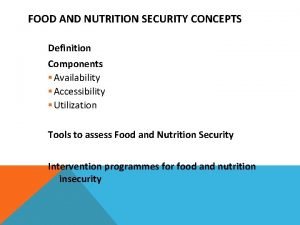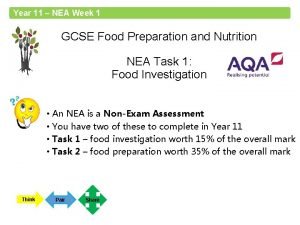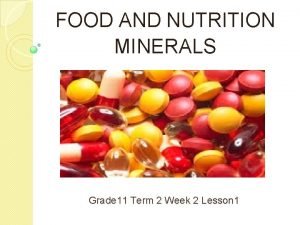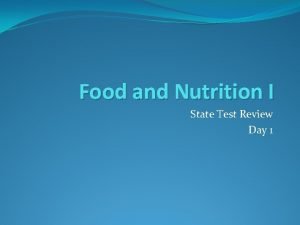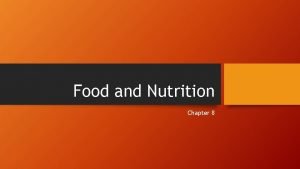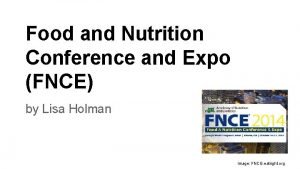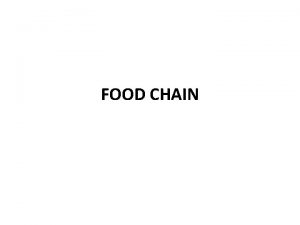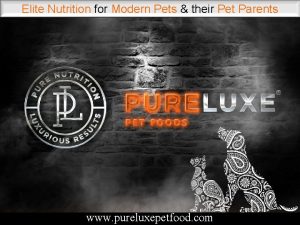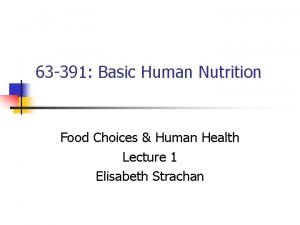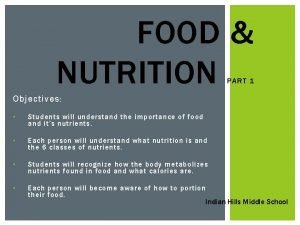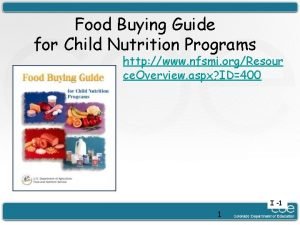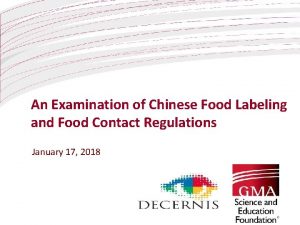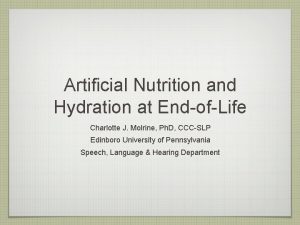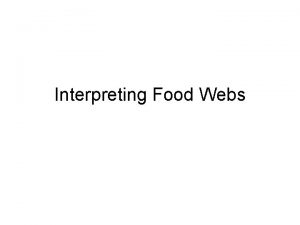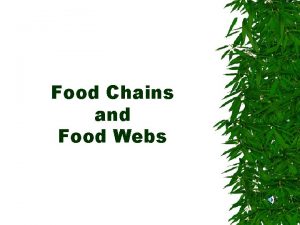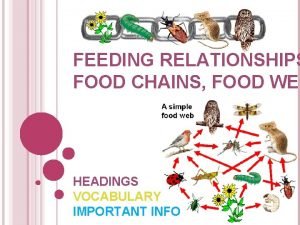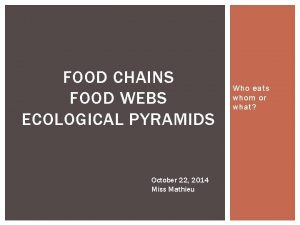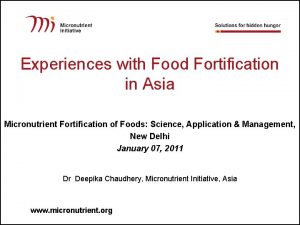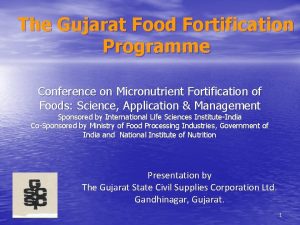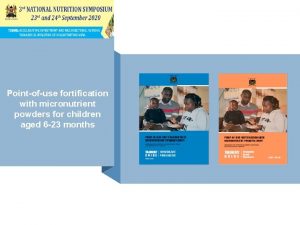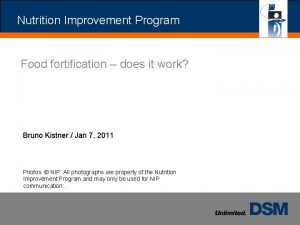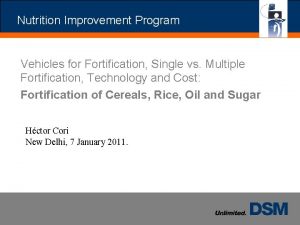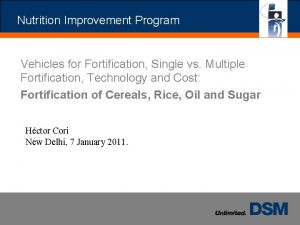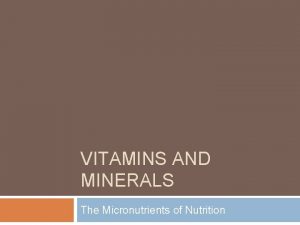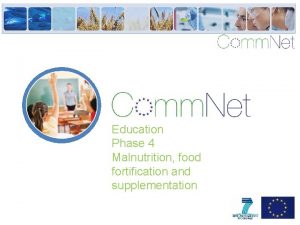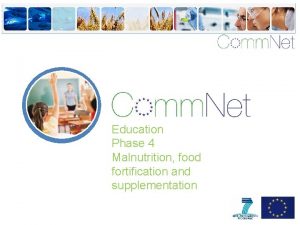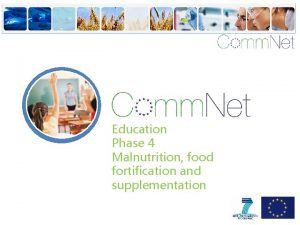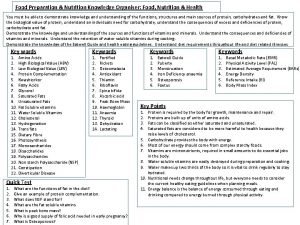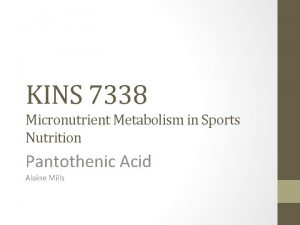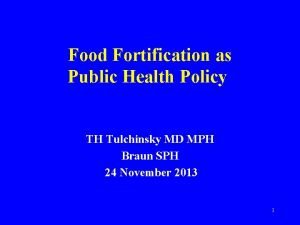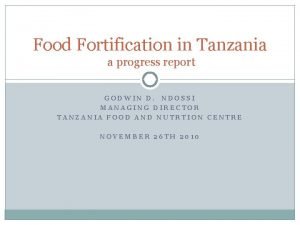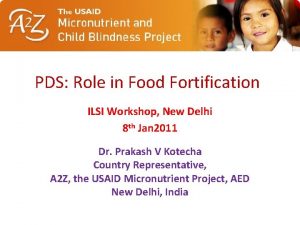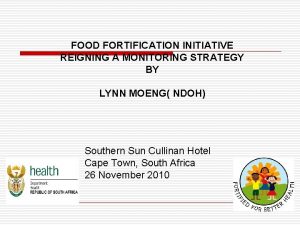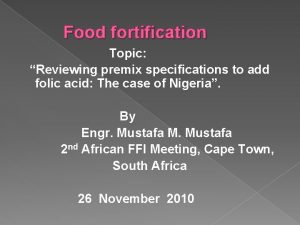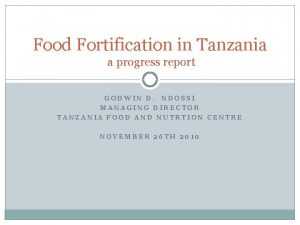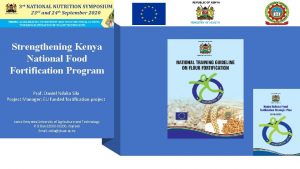Micronutrient nutrition and food fortification activities in China












































- Slides: 44

Micronutrient nutrition and food fortification activities in China Chen Chunming Chinese Center for Disease Control and Prevention International Life Science Institute Focal Point in China Jan. 2011

In the past ten years, the nutrition status of Chinese population has been dramatically improved in terms of energy and protein adequacy and general dietary pattern. But micronutrient deficiency is still a public health issue to be addressed, because of the plant food –dominant diet.

I. Current micronutrient nutritional status in China

(1) Iodine Successfully controlled by mandatory salt iodization since 1993 – The challenge will be program persistency Indicators 1995 1997 1999 2002 2005 Coverage of households consumed iodized salt (%) 39. 9 69. 0 80. 6 88. 8 90. 2 Median of urinary I 2 In children aged 8 -10 (μg/L) 164. 8 330. 2 306. 0 241. 2 246. 3 Goiter rate in children aged 8 -10 (%) 20. 4 10. 9 8. 8 5. 0% Source: National IDD Surveillance (MOH)

(2) Iron ■ Dietary intake of iron In 2002— 23 mg/reference man

Dietary intake (mg/d) and source of iron in Chinese diet Total intake Big cities M/S cities 24. 5 23. 5 Rural III 22. 6 24 Rural IV 22. 8 Food source of iron in diet (% of total intake) Cereals Soybean Vegetables Potato Meat & fish 32. 2 7 16. 5 1. 1 13. 3 41. 2 5. 6 13. 6 1. 5 12. 2 43. 6 6. 1 15. 8 10. 7 54. 4 5. 9 15. 2 2 6. 9 Source: 2002 Nationwide Nutrition and Health Survey 61. 6 4 11. 5 2. 4 2. 9 53. 3 7. 3 12. 6 3. 2 8. 7

Calculation of the intake of absorbed iron of Chinese Dietary intake of iron in 2002— 23 mg/reference man § Assumed absorption rate of iron in Chinese diet ~4% § Estimated Absorbed iron- 0. 92 mg 76% of requirement of adult man 54% of requirement of adult women 40% of requirement of 15 -17 yr adolescent girls (Actual intake: 20 mg )

Anemia prevalence of population in 2002 Male Female By age groups Children 6 -11 mon. 12 -23 mon. Women 18 -44 yr Adult >60 yr Pregnant women Urban 13. 4 21. 5 Rural 16. 7 24. 0 Nat’l 15. 8 23. 3 40. 6 29. 2 23. 7 19. 6 25. 3 37. 5 28. 9 27. 2 31. 6 30. 4 38. 3 29. 0 Source: 2002 Nationwide Nutrition and Health Status Survey, Report 1 28. 8 28. 9

Minor/no reduction of anemia prevalence along with economic growth Malnutrition of children under 5 steadily reducing. but anemia almost no change during 1998 -2005 Underweight % Year Stunting % 1990* Urban Rural 8. 0 22. 6 1995* 4. 6 17. 8 8. 9 39. 1 1998* 2. 7 2000* 3. 4 2002** 3. 1 2005* 1. 8 12. 6 13. 8 9. 4 8. 6 4. 1 2. 9 4. 9 2. 5 22. 6 20. 3 17. 3 13. 1 15. 2 12. 3 12. 7 11. 6 17. 7 26. 7 20. 8 20. 3 62 73 68 11 -15 % reduction during 1998 -2005 78 Urban 9. 4 Rural 41. 4 Anemia % Urban 13. 1 Rural 17. 6 - -

(3) Vitamin A § Vitamin A deficiency – Sub-clinical deficiency §Prevalence of VA Def (% Serumretinol<20 ug/dl in Children age 3 -12) § Children<2 – supplementation proves deficiency %

Plasma retinol level of Chinese children (3 -12 y) (μmol/L)

Prevalence of plasma retinol level <1. 05μmol/L in elderly population of China(%) Diagnostic criteria :VA(plasma) <30μg/dl

(5) Folic acid Serum and red blood cell folate concentration in Chinese childbearing age women by region Serum folate Red blood cell folate N Mean (nmol/L) Deficiency%(n)1 Mean (nmol/L) Deficiency % (n) South 901 16. 3 0. 78(7)* 533. 9 7. 8(70)* North 793 12. 6 4. 16(33) 305. 4 54. 9(435) Urban 864 15. 1 1. 5(13)* 463. 8 21. 2(183)* Rural 830 13. 8 3. 3(27) 362. 4 38. 8(322) Total 1694 14. 5 2. 36(40) 411. 9 29. 8(505) (n) Number of deficiency * P < 0. 05 compared with the North 1 Deficiency defined as serum folate< 6. 8 nmol/L(3μg/L) and red blood cell folate < 318 nmol/L(140μg/L) Source: Tang Yi

Prevalence of plasma folate deficiency in Chinese adults by region Plasma folate (n mol/L) South Deficiency North n mean n Urban 618 17. 39*# Rural 599 Total South North mean n % 613 8. 76 ## 34 5. 5* 205 33. 4 # 16. 31* 626 7. 86 36 6. 0* 254 40. 6 1217 16. 86* 1239 8. 30 70 5. 8* 459 37. 1 Source: Tang Yi * P< 0. 001 # Compared with the North P < 0. 05, ## P < 0. 01 Compared with the rural area

(6) Vitamin B 1 Thiamin Intake in Chinese Population ( mg /Reference man/Day) RNI for adult man 1. 4 mg

(7) Vitamin B 2 Riboflavin Intake in Chinese Population ( mg /Reference man/Day) RNI for adult man 1. 4 mg

II. Micronutrient fortification as a public health strategy

(1) National program development • Food fortification 1 Commonly consumed food fortification for general population accessible to rural, poor 2 In-home fortified food supplement for complementary feeding 3 Supplementation for pregnant and lactating mothers 4 Specific food fortification for disease prevention for areas with high prevalence • Priority nutrients Most common deficiency – Iron, iodine With serious consequence – Folic acid • Vehicles – salt, soy sauce, soy-based food, flour, rice, vegetable oil

(2) Framework of food fortification program • Staple food/condiments for general population • Fortification for complementary feeding • Supplementation for pregnant women and young children (3) Fortified foods as tools for public health goal must be: • Available in rural market – production, marketing, to meet the consumer demand. • Accessible to rural households – distribution mechanism. expansion of distribution network. • Acceptable to consumer • Affordable by general rural families – cost, packaging, price.

(4) Environment for sustainable food fortification program • Integrated social marketing and public education-Ensure supply and enhance demand • Policy and legislation encouragement -Incentives and food quality and safety assurance • Social responsibility of industry (manufacturer, retailers, super markets, village shops……. ). • Public-private partnership

Government Science for policymaking Information Legislation & standards Education Incentives for Community mob. products Funding Consumers Education Professional societies Technical support Monitoring & evaluation Policy making Advocacy/community mobilization Sectoral coordination Good Products Social marketing Research, Information assist Social marketing Funding Collaboration Industry Product development reform/innovation Pricing strategy Distribution network Public-Private Partnership for food fortification

Activities combating micronutrient deficiencies in China

Progress of activities 1. soy sauce fortification

Iron fortified soy sauce: product development Annual output reached 93, 000 MT 110 products produced by 22 producers marketed, Based on grades of soy sauce: Grade 1 – 23 products; Grade 2 – 14 products; Grade 3 – 66 products; Special grade – 7 products. Based on types of packaging: Bottle – 56 products; Soft bag – 27 products; Barrel – 27 products。 Price ~ 10% higher than regular products

Production volume of fortified soy sauce MT*1000 100 90 80 70 60 50 40 30 20 10 0 2004 2005 2006 2007 Year 22 producers joined after training and improvement, Zhen Ji Group at Hebei province designated as a iron fortified soy sauce production base.

Consumer coverage 59. 35 million Chinese residents use fortified soy sauce, including 39. 87 million of at-risk population Baseline After 1 yr After 2 yrs IDA prevalence significantly decreased (women) 80% of at-risk population aware of the health benefits of iron fortified soy sauce

Anemia prevalence in the at-risk population reduced 30% or more in 7 provinces (sentinel data) Baseline After 1 yr After 2 yrs

2. Nutrient-dense food supplement (YYB) for complementary feedng

Reduction of anemia prevalence Reducing the rate of children anemia by using Fortified food supplement Reduce 47% for using 6 months %

Sustained Intelligence development of children supplemented with fortified food supplement FFS NFFS Control Supplement food added to CF during 6 -24 month of age. IQ Test done after completion of supplementation at age 3 -4, 4 -5, 5 -6 years old

Ongoing activities on the application of nutrient-dense supplement food (YYB) in China(1) Activity Settings Institution Effectiveness Earthquake areas Li xian Children 6 -24 months China CDC, Unicef, Gain Company: Bailemai Since 2008 Sept. Anemia % from 71. 8% reduced to 31. 9% in 1. 5 years Prevention Program 8 earthquake counties in 3 province Children 6 -24 months MOH, Unicef, China CDC Companies: Bailemai, Since 2010 June Extension Program 12 provinces 23, 000 children 6 -24 mionths MOST, China CDC Since 2010 April Established distribution mechanism Companies:

Ongoing activities on the application of nutrient-dense supplement food (YYB) in China(2) Activities Social Equity Project- policy research Settings Institutions Effectiveness 2 counties in 2 provinces( (Qinghai & Yunnan ) Province a. 6 -24 months children YYB daily b. multi nutrients supplements for pregnant women CDRF, China CDC , ILSI-FP China Since 2009 Sept. in 12 months: a. Anemia reduction from 66% to 38. 7% b. Stunting % of children aged <18 month reduced c. Diarrhea and fever incidence reduced d. % of LBW halved Company: 1. DSM for YYB. 2. Shiji Weita for supplements for pregnant women

3. Fortified wheat flour in shanxi

Flour fortification § 1993 -2000:RETA Project , Science and feasibility study of flour fortification § 2000 -2002:Technology study of flour fortification in Chin。 § 2003 -2008:Wheat fortification in Reforest compensation program: Dingxi project Wheat flor fortification in high NTD prevalence counties in Shanxi § Current discussion on regional wheat flour fortification The colored part in the figure are the major wheat consumption provinces in Mainland China, among them, Henan, Hebei and Shandong are the provinces with biggest production and consumption.

1. NTD incidence in relation to the consumption of fortified wheat of women in a county (with 9132 child -bearing age women involved) in Shanxi( n=846) 食用量 <1000 g/m (<33 g/day) FA*<22 ug/day 1000 g/m~ (33 -116 g/day) FA 23 -78 ug/day 3500 g/m~ (117 -233 g/day) FA 79 -157 ug/day >7000 g/m (>234 g/day) FA >158 ug /day Total Live birth Normal NTD Incidence(‰) 6. 8 53 5 86. 2 31. 8 266 3 11. 2 16. 8 141 1 7. 04 44. 6 376 1 2. 65 100. 0 836 10 11. 8 % * FA=folic acid, calculated by folic acid fortified in the wheat flour

2. Nutrient enrichment in wheat flour in Hebei and Gansu Province

Applied in 2211 rural households in 2 villages for 3 years (2003 -2006) Status of micronutrient deficiencies improved: § Iron deficiency reduced in terms of biological assessment § Serum folic acid and zinc level improved § Marginal vit. A deficiency reduced from 31. 9% to 3. 7% in Weichang and from 12. 1% to 2. 2% in Lanzhou.

4. Application of comprehensive food fortification in school

FFO of China CDC applied comprehensive food fortification interventions in Pu. Gong. Ying Middle school in 2007 Using fortified soy sauce and VA fortified vegetable oil for cooking, and consuming fortified rice among 500 students for 8 months: 1. Anemia Prevalence reduced to the average of the same area (see fig); 2. Marginal VA def. reduced from 15. 4% to 6. 4%.

Cost for comprehensive intervention Cost increased (Yuan/day) Fortified so sauce Boys 0. 0015 Girls 0. 0015 VA fortified veg. oil 0. 015 Multi-nutrients fort. rice 0. 06 0. 03 Eggs 0. 21 Total cost 0. 29 0. 26

5. Technology for rice fortification is matured

Appeal for partnership Government – Policy, regulation & standards, advocacy, sectoral coordination Scientists – Research, product evaluation, information, public education, assist social marketing Industry -R&D, production, distribution, price, safety, social responsibility, social marketing No partnership among them, no success of national program.

Looking into the future § The activities are supported by the governmental sectors such as MOH, National Grain Bureau, and local governments; § But still are at project basis and societal experiment level; § We are on the way of scaling up – Policy making, industry commitments to social responsibility on massive fortification, intensive and effective public education on the health and development benefits of fortified food are the requisites for scaling up. ; We fell confident , but there is a long way to go!

Thank you!
 Food delivery fortification
Food delivery fortification Premix for fortification
Premix for fortification Personalised fortification
Personalised fortification Conjunctivitius
Conjunctivitius +micronutrient +fertilizer +wheat
+micronutrient +fertilizer +wheat +winter +wheat +micronutrient
+winter +wheat +micronutrient Foods used in nutrition activities should be nutrient-dense
Foods used in nutrition activities should be nutrient-dense Now group these activity into indoor and outdoor activities
Now group these activity into indoor and outdoor activities Primary and support activities
Primary and support activities Primary activities and tertiary activities
Primary activities and tertiary activities Illuminate aqa food
Illuminate aqa food Datingoo
Datingoo Food and nutrition unit 4
Food and nutrition unit 4 Section 38-1 food and nutrition answer key
Section 38-1 food and nutrition answer key Food and nutrition unit 5
Food and nutrition unit 5 38-1 food and nutrition
38-1 food and nutrition Chapter 10 lesson 4 nutrition labels and food safety
Chapter 10 lesson 4 nutrition labels and food safety Chapter 10 lesson 4 nutrition labels and food safety
Chapter 10 lesson 4 nutrition labels and food safety Usda food and nutrition service
Usda food and nutrition service Food and nutrition unit 5
Food and nutrition unit 5 Factors to consider when choosing labour saving devices
Factors to consider when choosing labour saving devices Food and nutrition security definition
Food and nutrition security definition Section 38-3 the excretory system
Section 38-3 the excretory system Gcse food tech nea 2 example
Gcse food tech nea 2 example Food and nutrition grade 11
Food and nutrition grade 11 Three sink method
Three sink method Chapter 8 food and nutrition
Chapter 8 food and nutrition Food and nutrition expo
Food and nutrition expo Unit 2 food food food
Unit 2 food food food Food chain food chain food chain
Food chain food chain food chain The statement of cash flows helps users
The statement of cash flows helps users Extroidinairre
Extroidinairre Dri vs rda
Dri vs rda Food n nutrition
Food n nutrition Food nutrition
Food nutrition Fbg calculator
Fbg calculator China food labeler
China food labeler Food preparation activities
Food preparation activities Pros and cons of artificial nutrition and hydration
Pros and cons of artificial nutrition and hydration Primary secondary tertiary food chain
Primary secondary tertiary food chain Food chains producers
Food chains producers Food chain
Food chain Levels of nourishment in a food chain
Levels of nourishment in a food chain Difference between food webs and food chains
Difference between food webs and food chains Food chains, food webs and ecological pyramids
Food chains, food webs and ecological pyramids
